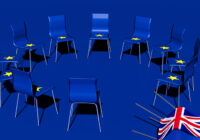In the past, emotions in politics were too often negatively defined, dismissed as symptoms of immaturity and irrationality.
“I’m mad as hell and I’m not going to take it anymore!” shouts news anchor Howard Beale in the 1975 movie Network. Thousands of ordinary people follow his lead, raising their voice from open windows and down in the streets. In the end, Beale comes to the realization that he was just another pawn in a much larger cynical game of commerce and greed — manipulated protest to drive up ratings.
There are few movies that better capture what these days has become commonplace in most advanced liberal democracies — the fact that more often than not politics is driven by raw emotions. The appeal to emotions has been the most effective driver behind the success of right-wing populist parties. Emotion-driven voting to a large extent explains the election of Donald Trump in the US, the outcome of the Brexit referendum in the UK and, most recently, the breakthrough of the Alternative for Germany (AfD) party in last year’s Bundestag election.
Take for instance Trump’s victory in Wisconsin, a state largely benefiting from international export trade in high-value-added manufactures, providing jobs to 20% of Wisconsin’s labor force. Economic concerns were clearly not desperate enough to push voters into the arms of Trump. Neither was there a particularly burning desire to see a wall built to keep out Mexican migrants on the other side of the country.
Instead, as Catherine J. Kramer has contended, support for Trump was largely an emotional response to apparently deep-seated psychological injuries stemming from a sense that rural folks “were not getting their fair share of respect,” that on the rare occasions that city dwellers paid any attention “to people in places like theirs,” they looked down upon them spurning them “as uneducated racists.” Dismissed as a “basket of deplorables” by Hilary Clinton, they took revenge the only way open to them, confirming once again that election time is payback time.
Fed Up and Disgusted
This episode provides an answer to one of the most puzzling questions in contemporary democratic politics: Why would anybody in his or her right mind vote for a political party whose program is largely devoid of any serious ideas of how to deal with the myriad of pressing challenges confronting our societies today? Take, for instance, the (once) northern Italian Lega Nord (Northern League), which went from promoting federalism to threatening secession (of a mythical Padania) to embracing Italian nationalism, including the (southern) parts of the peninsula once dismissed as the “beginning of Africa.” After years of being a subservient partner in various Berlusconi governments, the Lega had nothing tangible to show for its subservience to Berlusconi.
Yet in the most recent national election, the Lega soared in the polls, far outstripping its former center-right partners. There is no particularly rational explanation for this outcome (the same would apply for Berlusconi) if it were not for an admittedly lame recourse to raw emotions. Being thoroughly fed up and disgusted these days apparently counts as a perfectly honorable and reasonable motive to exercise one’s democratic privilege and duty.
Disgust is hardly the only emotion motivating ordinary citizens to cast their vote for the populist right. In Germany a few years ago, social observers discovered a new breed of political animal — the Wutbürger, literally translated as irate citizens. They have been behind the explosion of Zornpolitik (politics of rage), which recently discharged in a wave of support for the right-wing radical populist AfD, in large parts induced by Angela Merkel’s decision to open Germany’s borders to tens of thousands of Syrian refugees. The AfD’s eruption onto the German political scene is part of a larger affect-prompted political constellation aptly referred to as Empörungsdemokratie (outrage-driven democracy), which threatens to drown out and overwhelm level-headed deliberation.
This, however, is only half of the story. In the past, emotions in politics were too often negatively defined — dismissed as symptoms of immaturity and irrationality. As a result, the left was at a significant disadvantage. Only a few of its mêtre-penseurs understood and appreciated the force of emotions. One of them was the heterodox German Marxist philosopher Ernst Bloch, who in the second half of the 1930s explained the success of the Nazis in beguiling a large part of the German population. The Nazis, he observed, “have spoken deceptively, but to human beings; the Socialists, completely truthfully, but of things.”
The lesson drawn from this insight is still relevant today: Technocratic reasoning might be level-headed, even effective, but it fails to ignite people’s imagination. Unfortunately, however, with the “exhaustion of the grand narratives of modernity” — most notably the notion of progress — the left has lost its most important ideational asset, which in the past set it apart from the conservative right.
Moral Emotions
These days, the appeal to affect is to a large extent an appeal to negative emotions, centered upon the mobilization of anger and particularly anxiety, most prominently today with respect to the challenges posed by Islam. Here, the populist right is at a clear advantage, given widespread worries in Western societies with regard to the future. In France, for instance, in 2016 more than 60% of respondents were pessimistic about their and their children’s future.
The crisis of the contemporary left — reflected most notably in the dramatic decline of socialist and social democratic parties in recent elections — is to a significant extent tied to their inability to offer an emotive response to voter anxieties. This has allowed the populist right to appropriate a number of “moral emotions,” most notably anger and resentment. In contemporary philosophical thinking, resentment is characterized as a moral emotion because it invokes notions of right and wrong.
Resentment is caused by a profound sense of injustice provoked by experiences of unfair treatment attributed to intentional malice or conniving machinations, which leave the individual with a sense that the game is rigged. It is an expression of justified and legitimate anger coupled with the expectation that the situation can be rectified and the claim to justice met. The upsurge in support for the populist right in advanced liberal democracies suggests that a growing number of citizens have lost confidence that this is the case, fed by the perception that the game is permanently rigged in favor of the powerful and wealthy. As a result, today the “politics of resentment” (ever popular as a title for academic and non-academic work) is almost exclusively associated with the populist right. In the process, resentment has once again taken on negative connotations, similar to the term populism itself.
Nostalgia
A second, equally potent emotion exploited by the populist right is nostalgia — the desire to return to an earlier, and allegedly better, age. Like resentment, nostalgia does not necessarily have to be negatively defined. The agrarian populists in the United States, for instance, who for a short period of time in the early 1890s posed a serious challenge to the entrenched political establishment, evoked Thomas Jefferson’s republican vision of an ideal community of small-scale, independent producers against the corrupt politics of the Gilded Age.
Right-wing populist nostalgia today is of a fundamentally different flavor. Trump’s backward-looking industrial policy, for instance, with its predominant focus on industries, such as coal and steel, that defined the heyday of postwar industrial predominance, is but a blatant attempt to stroke the injured ego of the Rust Belt working-class men to the detriment of emerging sectors, such as renewable energies.
In Western Europe, right-wing populist parties, such as Germany’s AfD, rile against gender equality while pretending they are only concerned with putting a stop to the new emphasis on “gender” gone out of control (what the AfD likes to call “gender folly”). What informs the campaign is nothing less than an attempt to turn back the clock, to return to a time when “men were still men” and women “knew their place” in society.
Australia’s maverick populist politician Pauline Hanson set the tone during her first foray into national politics in the 1990s. At the time she charged that the “Anglo-Saxon white male” was “the most downtrodden person” in Australia, victimized by developments that shifted the balance in favor of women — and “men don’t know what to do.” In fact, they do know what to do; they recently voted for Hanson’s One Nation, returning her to the political limelight, this time under the anti-Islamic banner. Her reelection shows that the emotive brew of anxiety about the future on the one hand, and resentment, anger and outrage with respect to the political and cultural elite on the other, is a potent residue just waiting to erupt.
With the established left seemingly incapable of offering a convincing response to the panoply of emotional injuries inflicted these days on large parts of the population in advanced liberal democracies, the populist right is likely to maintain its hold on a considerable swath of the electorate. As long as questions of culture, identity and emotions continue to trump economics, the populist right is likely to continue to have a bright political future.
*[Centre for Analysis of the Radical Right is a partner institution of Fair Observer.]
The views expressed in this article are the author’s own and do not necessarily reflect Fair Observer’s editorial policy.
Photo Credit: cosimoattanasio – Redline / Shutterstock.com
Support Fair Observer
We rely on your support for our independence, diversity and quality.
For more than 10 years, Fair Observer has been free, fair and independent. No billionaire owns us, no advertisers control us. We are a reader-supported nonprofit. Unlike many other publications, we keep our content free for readers regardless of where they live or whether they can afford to pay. We have no paywalls and no ads.
In the post-truth era of fake news, echo chambers and filter bubbles, we publish a plurality of perspectives from around the world. Anyone can publish with us, but everyone goes through a rigorous editorial process. So, you get fact-checked, well-reasoned content instead of noise.
We publish 2,500+ voices from 90+ countries. We also conduct education and training programs
on subjects ranging from digital media and journalism to writing and critical thinking. This
doesn’t come cheap. Servers, editors, trainers and web developers cost
money.
Please consider supporting us on a regular basis as a recurring donor or a
sustaining member.
Will you support FO’s journalism?
We rely on your support for our independence, diversity and quality.







